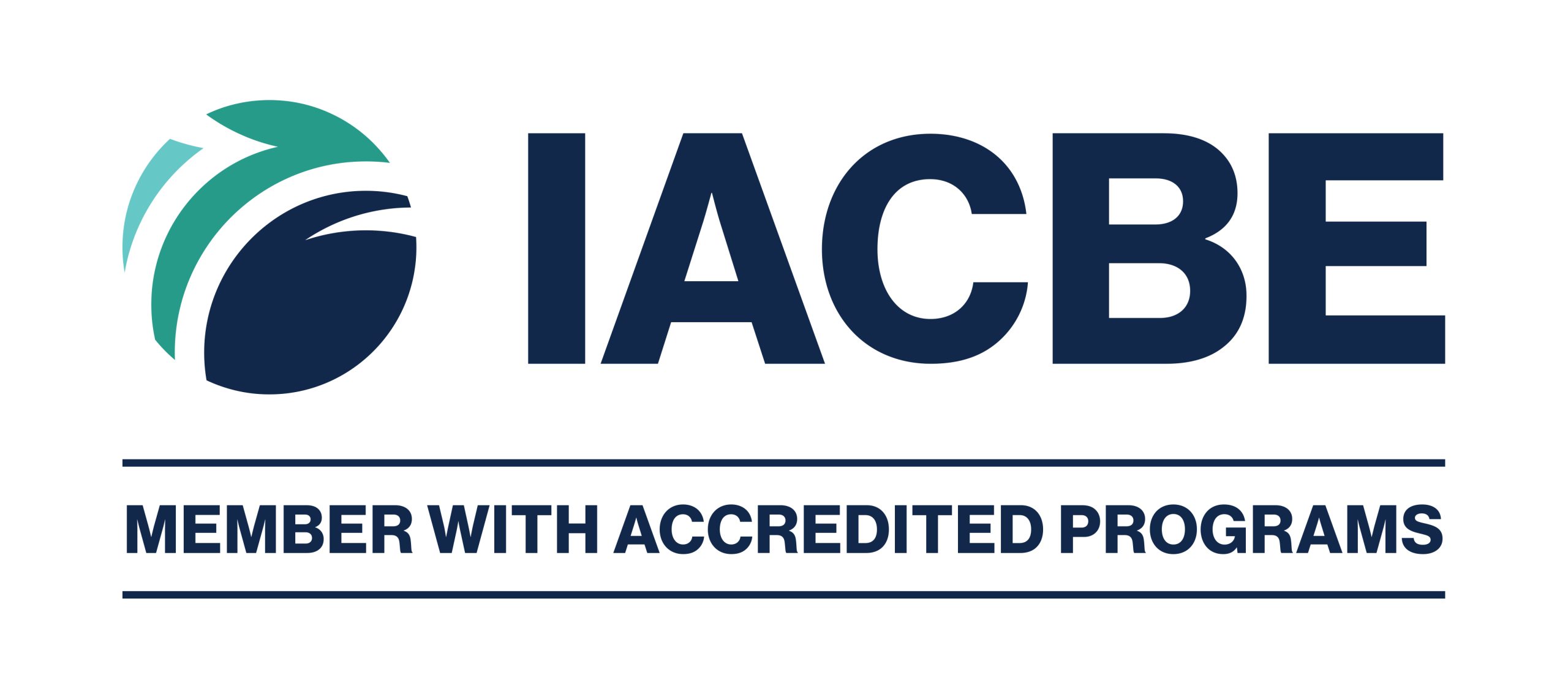Master of Business Administration – Finance
Prepare for a career in the world of finance.��
��
Financial experts play an important role in nearly all businesses and organizations. The Master of Business Administration with a specialization in Finance is the ideal program for students seeking a business degree that will prepare them for a career in the world of finance. This degree blends ˿����Ƶ’s core MBA curriculum with a series of finance-focused courses specifically designed to provide you with the skills necessary to succeed as a finance expert. Your degree may lead to a position in a wide variety of work environments, including areas such as accounting, personal finance advising, and financial management.��
Students specializing in Finance will graduate with a solid foundation in business organization and operations along with the specialized skills that are vital to a career in finance and finance-related fields. Students will complete courses covering business finance, managerial accounting, business ethics, innovative finance and venture capital, corporate financial management, global corporate finance, and more.��
Graduate Capstone��
Students are required to complete a capstone project. This individualized project allows students to apply knowledge and skills acquired in their courses and real-world experiences. It is designed to promote vital assets of learning integration, synthesis, and expertise in change management and leadership.��
Enjoy Flexibility– 10 online courses with program start dates every 2 weeks��
Choose Where You Learn– Online courses����
Affordable Monthly Payments��
Focus on Your Passion– Choose your capstone project��
Why More Students Are Choosing Aspen


MBA Courses��
��������’s MBA curriculum features 10 courses designed to equip you with advanced leadership and management skills. Taught by experienced educators from diverse industries, you’ll have the opportunity to apply new knowledge directly to your field through the integration of your MBA capstone project.
View the course schedule for this program:
-
MGT500 - Management
-
BUS530 - Marketing Management
-
BUS560 - Business Ethics
-
BUS510 - Managerial Accounting
-
BUS550 - Business Finance
-
BUS540 - Managerial Economics
-
BUS551 - Corporate Financial Management
-
BUS552 - Innovative Finance and Venture Capital
-
BUS553 - Global Corporate Finance
-
BUS799 - Graduate Capstone
Management provides a solid foundation for facing the challenges of a rapidly changing and highly competitive business environment. This course introduces the fundamental management functions of planning, decision-making, organizing, leading, and controlling, as well as the tools and techniques of managing people, processes, projects, and the work environment. Students explore current issues in management and gain insights into how successful organizations operate.
3 CreditsRequired Books
This pulls together specialized models, tools, and processes from the perspective of the manager who is responsible implementing a coordinated marketing program. Because consumers and business buyers face an abundance of suppliers seeking to satisfy their every need, companies and not-for-profit organizations cannot survive today by simply doing a good job at marketing management. They must do an excellent job if they are to remain in the increasingly competitive global marketplace. Many studies have demonstrated that the key to profitable performance is knowing and satisfying target customers with competitively superior offers. This process takes place today in an increasingly global, technical, and competitive environment. Marketing management is the conscious effort to achieve desired exchange outcomes with target markets. The marketer's basic skill lies in influencing the level, timing, and composition of demand for a product, service, organization, place, person, idea or some form of information.
3 CreditsRequired Books
Today’s managers face many different opportunities to make decisions ethical and unethical as they compete with other firms. This course will provide an opportunity for managers to take business ethics seriously. That means taking the time to understand the core elements of the system that have gone awry and led to some extreme behaviors. Business ethics is primarily about business. This course will allow managers to get beyond the view of business as separate from ethics by allowing an opportunity to understand that business ethics is a fundamental of business management. This course begins by exploring the inherent values of future managers, how ethics is an integral aspect of an organization’s value-creation activities and aspirations.
3 CreditsRequired Books
Accounting, the language of business, provides crucial decision-making information to business organizations. This introduction to financial and managerial accounting prepares students to construct and interpret financial statements, generate budgets, and to use accounting data for strategic and management purposes with an emphasis on profitability. Legal and ethical issues in accounting are also discussed.
3 CreditsRequired Books
This course explores financial statement and cash flow analysis and the time value of money. It presents information on bonds and stock valuation and risk, return, and value. There are also discussions on capital budgeting processes and techniques, cash flow and capital budgeting, and cost of capital and project risk. Options and the international financial market are discussed as well.
3 CreditsRequired Books
Economics is the study of how resources are allocated. People of a nation and their government decide how much of a commodity should be produced and how that commodity is allocated. The allocation is done by a price system in free markets. There, prices determine how commodities are to be allocated, and prices determine how much should be made by a business. Microeconomics conveys the study of this allocation system to the level of an individual business. For over 200 years, business behavior has been carefully studied, conclusions made and tested, the models formulated and refined. Managerial Economics draws on the principles of economics and applies them to managerial decisions. It is incumbent on the student to be well versed in economic theories, models, and concepts so that their applications are pertinent, appropriate, and well-reasoned.
3 CreditsRequired Books
This course guides students to develop intuition about decision making that will hold true through future evolutions in the financial world. It provides an integrated view of the theory of finance providing timely, real word examples and connecting the theory with practice. The course covers important corporate financial management topics and theories including options, agency theory, corporate governance, capital budgeting, long-term financing, risk analysis, and international corporate finance.
3 CreditsRequired Books
This course provides a connection between finance theory and venture capital practice. It explores cutting edge financial tools applied to venture capital and research and development investing. Various techniques are explored, including Monte-Carlo analysis, real options, binominal trees, and game theory.
3 CreditsRequired Books
This course is designed to provide an overview of the global financial environment, such as motives for foreign trade and investment, the balance of payments, and the international monetary system. It deals with the forces that affect the relative prices of currencies in international markets. The course goes on to describe sources of global corporate finance and discusses the management of assets.
3 CreditsRequired Books
The capstone project allows students to apply the knowledge and skills acquired in their courses to the work environment. This project is completely individualized; students are encouraged to select work-related projects that are of particular interest to them and that will result in professional growth and benefit the organization.
3 CreditsRequired Books
“The faculty is top-notch, and the instructors are some of the best. Their ability to link learning materials to things in your life to make that “connection” is vital for learning, and Aspen instructors in the School of Business and Technology have been amazing for me.”
David G.
MBA Project Management, graduated April 2024Cost & Time to Completion
The Best Fit for Working Adults
We understand the difficulties in pursuing your MBA when you have a demanding work schedule. The 8-week courses at ˿����Ƶ allow you to complete your program in as little as 2 years. ��
Our Monthly Payment Plan Makes Us Different.
Paying for your MBA ����dzܱ����’t be complicated. Our Monthly Payment Plan makes it easy for working nurses to finance their MBA program.
Tuition Rates
| $12,900 | Tuition |
| $2,025 | Fees |
| $1,500 |
Estimated
Textbook
Costs
|
| $16,425 | |
Other Ways to Finance Your MBA

Students who have served, or are currently serving in the United States Military and their legal spouses are eligible to receive a from ˿����Ƶ.

˿����Ƶ is currently approved by the U.S. Department of Education to offer federal student aid for the MBA program.��

˿����Ƶ maintains employee tuition discount partnerships with a large and growing number of organizations. Tell your enrollment advisor where you work and ask them to check for you prior to enrolling.��

Aspen offers several payment plans for students to fund their education.��
Earn Your MBA with Confidence

The School of Business and Technology at ˿����Ƶ has received specialized accreditation for its business programs through the International Accreditation Council for Business Education (IACBE) located at 11960 Quivira Road in Overland Park, Kansas, USA. For a list of accredited programs please view our IACBE Member .
Clayton W.
MBA Information Management, graduated July 2021Admission Requirements

Application – A completed application; Aspen does not charge an application fee��

Bachelor’s Degree – Official Transcript demonstrating a bachelor’s degree from an institution that is accredited by a CHEA recognized accrediting body or an international equivalent; applicants must have earned at least a 2.5 GPA in their bachelor’s program (see for more information)��

Government-Issued Photo Identification – Identification must be valid, current, and legible.
Career Outlook��
An MBA Finance degree equips graduates with advanced financial management skills, preparing them for leadership roles in a variety of sectors, including corporate finance, investment banking, asset management, and financial consulting. The demand for finance professionals with strategic and analytical capabilities is strong and expected to grow as businesses navigate increasingly complex global markets.��
According to the , business and financial occupations are projected to grow at a faster rate than average from 2023 to 2033 with an average of 963,500 job openings each year. Growth in financial and management sectors is driven by the expanding complexity of financial regulations, the globalization of business, and the increasing need for risk management and financial planning. There is a demand for professionals who can manage investments, strategize for financial sustainability, and navigate the complexities of mergers, acquisitions, and globalization.��
The also highlights that as organizations grow and diversify, there will be a heightened need for project-oriented professionals who possess financial expertise. This convergence of project management and finance opens up further career opportunities for MBA graduates with a finance specialization. An MBA Finance degree from ˿����Ƶ prepares you for these dynamic and rewarding roles, positioning you to take advantage of the growing demand for financial leadership in a variety of industries.��
Average Annual Salary for Financial Managers
$174,820
Data pulled from the in Fall 2024. Salary can vary widely depending on geographical location and role.��
MBA Frequently Asked Questions
-
What is an MBA degree?
-
Is ��������’s MBA program accredited?
-
Can I finish my MBA degree online?
-
What specialties are offered in the MBA degree program?
-
Can multiple specialties within the MBA program be completed simultaneously?
-
Does Aspen recommend any supplemental learning to support students completing the MBA program?
A Master of Business Administration degree is a graduate-level degree that prepares graduates for advanced leadership and management roles in business.��
Yes, the MBA program is accredited by the Accreditation Council for Business Education.��
Yes, ��������’s MBA degree programs are completed online.��
Aspen offers MBA degrees specializing in Finance, Information Management, and Project Management.��
No, students can only complete one specialization.��
Students without a strong mathematics background are encouraged to check out . The focus at MBA Math is on the basics, making efficient use of your time. With the greater confidence of a firmer quantitative foundation, you will be positioned well to take on the challenges of the MBA program! You work at your own pace, according to your particular needs, making use of the teaching materials as you wish.����


